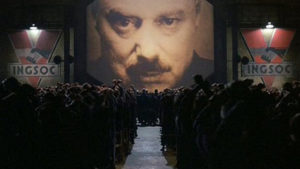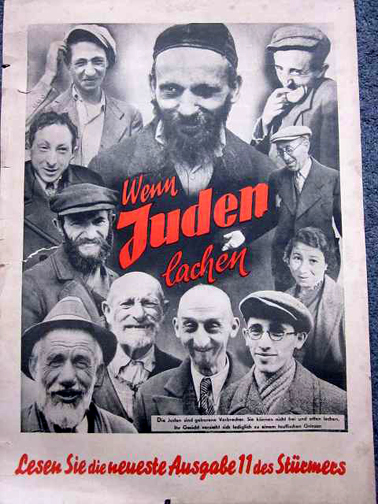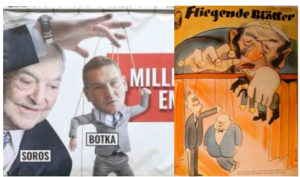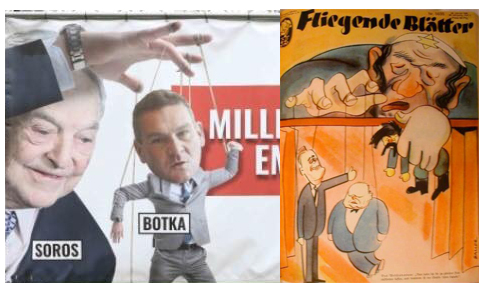Last week the anti-NGO law came into effect in Hungary. From now on, NGOs receiving more than 26,000 USD per year from international donors have to register as “foreign-funded NGOs”, report donations, and attach a warning to every publication (read my earlier article here!). Although the government claims the law only aims to improve transparency, this is really just a fig leaf, designed to mislead the EU and to conceal the real purpose: to stigmatise and blacklist us. If you have any doubt about this just look at the new hate campaign launched by this administration against George Soros, the philanthropist whose Open Society Foundation has been a major donor to human rights NGOs in the region!

Do you remember Two Minutes Hate from George Orwell’s book, 1984? In this dystopian novel people had to attend a hate session every day to watch a movie about Emmanuel Goldstein, the public enemy number one, and express their hatred for two minutes. Our Big Brother, Viktor Orban, created his own enemy, George Soros, who is depicted as an evil billionaire leading an international conspiracy against Hungary. This video clip below, produced by the Hungarian government and broadcast every day on national television, transcends Orwell: it concentrates hate into 30 seconds.
And if this clip was not enough, look at these giant billboard posters, placed virtually everywhere in Hungary, and paid for by tax payers. The poster shows George Soros laughing. The message: “Don’t let George Soros have the last laugh!” So this laugh is not an innocent laugh – this is the maniacal laugh of those evil villains from Hollywood B-movies, when everything is going according to their sinister plan, mocking the hero and rejoicing over the doom of the world.

It reminds me of Der Ewige Jude, The Eternal Jew of Nazi propaganda posters, giving a malevolent grin while counting his money over the corpses of his victims. The image of the laughing Jew was used by Nazis to incite hatred because there is nothing that can anger people more than someone who is displaying malevolence. “Once the Germans Jews laughed at my prophecy … they will stop laughing altogether, and I will fulfil my prophecy in this field too,” Hitler said in 1942. “The Jews laughed in Germany too when they first saw us. They are not laughing any longer,” said Joseph Goebbels in 1943. The Nazi newspaper, the Stürmer even published a special issue addressing the “diabolical” laugh of the Jew, see below!

A poster advertising the next issue of Stürmer in Nazi Germany.
The text says: “The Jews are born criminals. They cannot laugh freely and openly. Their face twists into a devilish grin.”
What makes this comparison even more scary is the background of this photo: these billboards have been placed in front of the railway station from where the Hungarian Jews were deported to Auschwitz, where a new holocaust museum will be opened. Of course our government vehemently rejects all accusations of anti-semitism and theoretically, they are right. They do not incite hatred against a group of people based on their religion or ethnicity, like the Nazis did. They even built a strong partnership with some Orthodox Jewish groups whose conservative views mirror their own. Still, the Hungarian government is using the same Orwellian methods as those totalitarian regimes, to scapegoat a Jewish billionaire and repress independent civil society. I am not sure that the fact that it is not directly anti-semitic makes it better. What really matters here is the pattern of fear-mongering, dehumanising propaganda that reminds us of the darkest periods of history.

Left: Orban’s propaganda poster showing George Soros as a puppet master, playing with the leader of a left wing opposition party.
Rights: a Nazi propaganda picture showing a Jewish puppet master.
When I was a child and I read about how Fascism and Stalinism had come into power in the first half of the 20th century, I wondered how people could let this happen. I supposed people who lived back at that time period were less educated and had no clue about the consequences of their actions. After the holocaust and the gulag, they must have learnt the lesson, and now people would not allow such terrible things, I assumed. When I grew up, I realised that my assumption was wrong. Watching the images from the televised Bosnian war, just a few hundred kilometres from my home, I had to admit that people don’t learn from history. The power of education has limits and behind the mask of our civilised selves, hidden in the dark, a monster is waiting to be awoken by fear, pain or hunger. And it is far too easy to wake up this monster with hateful propaganda.
Peter Sarosi




